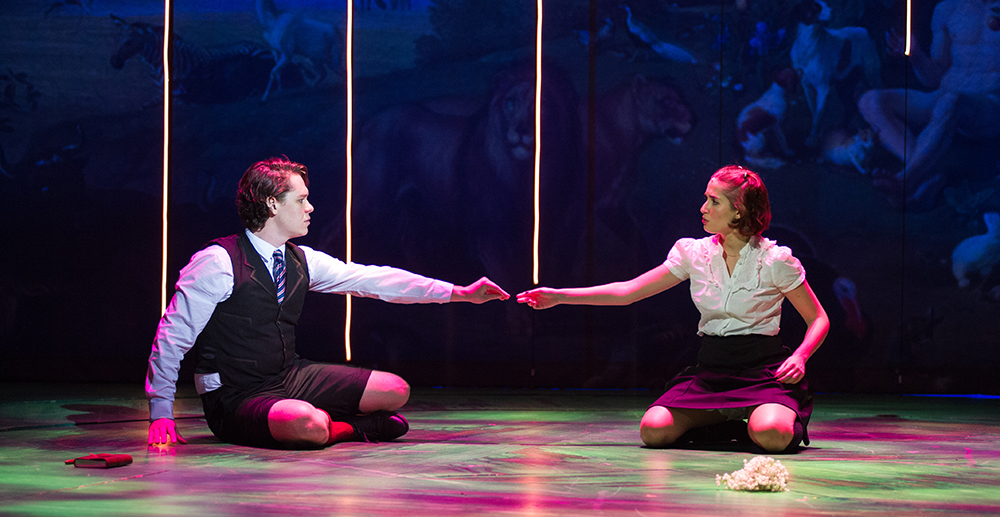Culture
 Evan Daves (Melchior) and Cristina Sastre (Wendla) // Photo: C. Stanley Photography
Evan Daves (Melchior) and Cristina Sastre (Wendla) // Photo: C. Stanley Photography
Round House Theatre Delivers Intimate Spring Awakening
February 14, 2020 @ 12:00am
Round House Theatre is in the midst of an ambitious run of Spring Awakening – the now revered Tony-winning musical adaptation of a once-shunned play turned cult classic – directed by Alan Paul.
When playwright Frank Wedekind introduced Spring’s Awakening, A Children’s Tragedy to Germany in 1891, he ignited scandal and censorship that carried through to 1917 when an English-language production in New York was shut down after only one run.
Why? Wedekind’s Spring’s Awakening called attention to the injustices inflicted on generations of youth at the hand of a draconian society, with open condemnation of sexual repression, physical and emotional abuse, and antiquated educational systems.
Revived in 1999 as a musical with book and lyrics by Steven Sater and music by Duncan Sheik, the new Spring’s Awakening was well-received by a relatively more “woke” audience, but one not unfamiliar with nor immune to the original play’s commentary and its characters’ struggles.
In a book that is overloaded with every kind of struggle possible – incest, potential rape, suicide, teen pregnancy, abortion, death, ignorance, child abuse – it is a delicate balance that must be attained to ensure your audience isn’t simply overwhelmed.
Paralleling the stubborn persistence of the play itself and its enduring themes, we lose sense of time during Paul’s production – not a flaw, but rather a nod to his successful creative direction. For example, the wayward bohemian Ilse is skillfully handled such that we never know whether she ever really existed among the other children, or rather as one of those theatrical spectors meant to ferry us through the ephemera of time and space that is at once Victorian-era Germany, contemporary America, the stage, and our own real lives. The Roundhouse rendition runs through February 23.
Tonya Beckman (Adult Women), too, functions as a touchstone. It is perhaps ironic that while Beckman’s character is meant to represent repression and/or willful ignorance, her familiar dynamism guides and balances the rest of the young cast’s green energy.
There’s not a bad seat to be had in the newly renovated Round House. Updates to the stage including a mechanically rotating floor offer the players opportunities to effectively explore movement, choreography and attention, which is ultimately this production’s greatest strength.
There is value in playing a piece that illuminates eternal aspects of the human condition. But the mere fact of timelessness does not grant abdication from responsibility to progress. That doesn’t come in the form of a pop-punk score, Doc Martens and dyed hair. Instead, for the show, Paul brought on Lorraine Ressegger-Slone as the team’s Intimacy Coordinator.
Ressegger-Slone’s work is part of a growing trend seen in theaters across the country, wherein rather than being told to embody the physical and emotional state of a character, actors are being taught how to convey emotion through physicality in a way that protects them from potential trauma.
Having worked for several years as a movement director, predominantly with women and female-identifying actors on work that was intimate in nature, Ressegger-Slone says becoming a Theatrical Intimacy Educator was a natural progression and that her role is twofold.
She serves as an asset to the choreography team, ensuring movements are repeatable, safe and specific, and that actors are consenting to the work – making important distinctions of work on stage as, for example, simulated sex scenes, not sex scenes. She also functions as a kind of HR for actors.
“I’m there to help them articulate and set boundaries, to be an advocate for them, to voice any issues that may arise for them to the production team. I’m holding the space and making it as safe as possible, knowing that it will never be completely safe, holding myself and everyone else accountable. In this way we build a ‘brave’ space so that we get to a place where people are comfortable being uncomfortable,” Ressegger-Slone says.
This work translates, too, to the audience’s experience of the performance. In considering the gaze, and expectations of performance, Ressegger-Slone is able to help the performers navigate what it means to challenge the idea of consent, for example. Who is consenting to be seen, in what way, and when?
“Break down the audience’s expectations is the most important part of getting the truth and allows the audience to also bask in the truth of that moment,” she says. To accomplish this she incorporates a lot of breathwork. “We use breath and expectation in a way so we can have the audience on the ride with us, but we’re [in control]. How can a physical movement convey an emotion?”
In this way, actors are freed from the intimidation of chemistry and considering how much of themselves they’ll have to give away – which can be especially important to a young cast experiencing scenes intimate in nature for the first time.
In addition to Ressegger-Slone’s work with the cast and crew, Round House is providing access and educational programming in conjunction with the show’s run, including free tickets for teens and college students, and events like a February 6 post-show discussion with SIECUS and Planned Parenthood of Metropolitan Washington on the importance of consent-based sexual education and youth advocacy in 2020.
Spring Awakening runs through February 23. For information about dates, times and tickets, visit here.
Round House Theatre: 4545 E W Hwy. Bethesda, MD; 240-644-1100; www.roundhousetheatre.org








